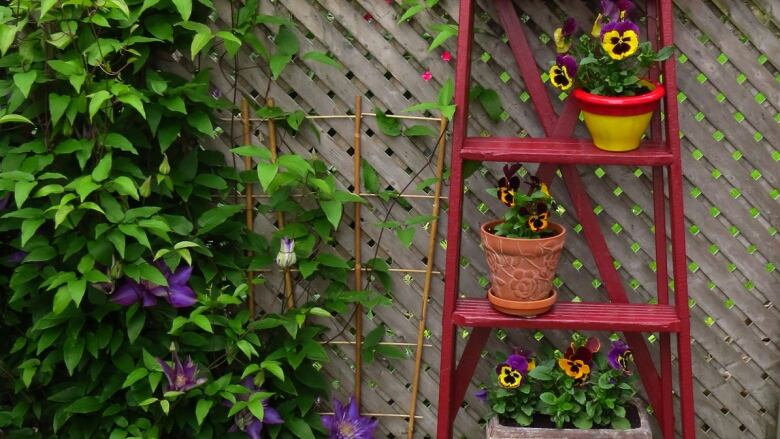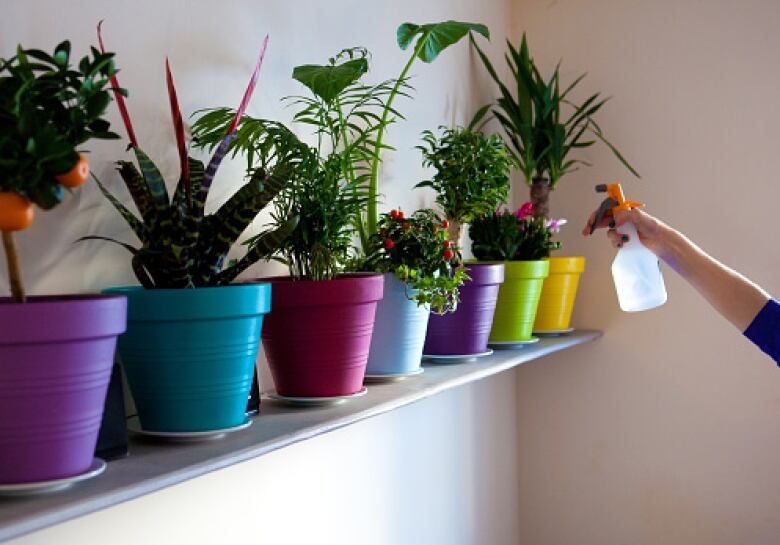5 things you should stop doing in your garden
Gardening expert Larry Hodgson says some gardening practices are actually myths

Listening to heavy metal won't kill your plants and snails don't actually mind slithering on egg shells, according to Larry Hodgson, Quebec City gardening expert and author of the Laidback Gardener series.
He debunked common gardening myths on CBC Radio's All in a Weekend.
Go ahead and blast Metallica
Your neighbours may raise their eyebrows, but your plants will be just fine if you listen to hard rock or heavy metal while you are gardening, according to Hodgson.
He said the myth that plants prefer classical music over harsher sounds dates back to a 1973 experiment by an undergraduate student who claimed that rock music, like Led Zeppelin and Jimi Hendrix, made plants recoil, while they seemed to enjoy sounds of J.S. Bach and classical Indian music byRaviShankar, according to the New York Times.
"She was studying classical music, which could maybe indicate a certain bias," said Hodgson, who added it was never clear by what metrics the plants supposedly "did better"with classical music.
As for whether talking or singing to your plants helps them grow, Hodgson said probably not at least not directly.
However, if you are singing to your plants, chances are you arepaying closer attention to them.
"You tend to see things you might have missed. So it might show you the plant needs watering, or there's an insect," he said.
Slugs aren't deterred by crushed eggshells
Speaking of metal, gardeners tend to get pretty hardcore when plotting ways to rid themselves of their nemesis slugs, according to Hodgson.
Enter, eggshells.
"The theory behind it is eggshells are sharp, right? So the slug, as it crawls along would be cut if it crossed the eggshell barrier and bleed to death," he says.
But in reality, it's not so gruesome.
Slugs, who produce their own slime to smooth out their daily commutes, can easily glide over terrain far harsher than broken eggshells, such as rocks and broken glass.
In fact, Hodgson says, eggshells actually attract slugs.
"They tell the slugs that there's something good to eat there and they go for it," he says.
Slug bait such as ferric phosphate does work, Hodgson says, but another option is to choose your plants wisely to avoid planting anything they like.
He suggests opting for romaine lettuce, which does not attract slugs, over green leaf lettuceand thick leaf hostas instead of other varieties of hostas.
Coffee grounds don't keep insects away
While you're chucking those eggshells in the compost, you might as well dump the coffee grounds in too, because they won'tkeep pests away either, according to Hodgson.
As an organic product, coffee grounds can help fertilize plants, but only once they've decomposed, he said.
"Until they decompose, they give off compounds that are harmful to certain plants, [though] not all plants. And they can block the air and water circulation in the soil," said Hodgson.
Tomatoes are "seriously set back" by coffee grounds, he said, so it's better to wait until they've turned to compost with the rest of your scraps, so that all the harmful compounds are gone.
Don't line your pots with pottery shards
Hodgson said he used to believe that a layer of broken pot shards or gravel at the bottom of the pot would improve drainage, because that's what his father had donein the garden.
But he said it will actually do the opposite.

"When you have soil which is made of very fine particles and you pour water into it, it tends to hold onto the water and if there are particles that are much, much bigger below it, it blocks the drainage," he said. "Your plants can end up sitting in water."
Any pot with drainage holes will do just fine on its own, he said, though you can put a layer of paper or a coffee filter in the bottom of the pot to allow the water to flow freely, without losing your potting soil.
For terrariums, which don't have a drainage hole, it still doesn't help to put a drainage layer of rocks, he said, because the water doesn't have anywhere to escape.
"Terrariums are very shallow if you pour too much water in, that water is just going to go right up into the soil by capillarity. Your plants will be soaking in water all the time."
The only way to fix over-watering a terrarium, which only need about one or two spoonfuls of water a month, he said, is to use a turkey baster to suck out the excess.
Don't salt your tomatoes
Some gardeners believe that Epsom salts will increase the size and yield of tomatoes, but Hodgson said it's not likely.
Epsom salts contain magnesium and sulfur, which plants do need, but according to Hodgson those elements are very rarely missing in the soil.
"So if you don't need them, why add them?" said Hodgson.
He says you may be better off saving them to soak your feet after a long day gardening (though even there, the scientific evidence appears to be scant.)
He suggested using a complete fertilizer that includes nitrogen, phosphorus, potassium and all the nutrients a plant needs.
But don't go overboard on the phosphorusHodgson said some transplant fertilizers contain much more than plants can use, leaving the excess to wash away.
"It's going to end up polluting rivers, lakes and going into the groundwater," he said.












_(720p).jpg)


 OFFICIAL HD MUSIC VIDEO.jpg)
.jpg)



























































































